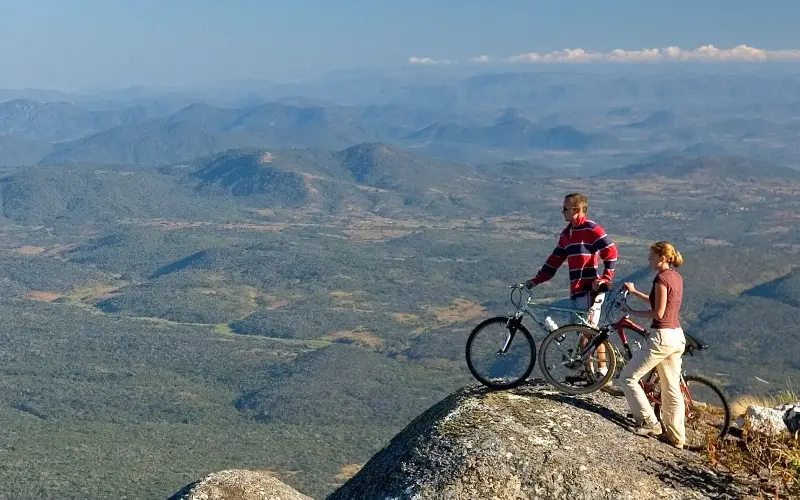
From my huge, glassless picture window at Mkulumadzi Lodge in Malawi’s Majete Wildlife Reserve, I can see and hear the mighty Shire River. By day, it wafts sublimely cooling breezes. At night, it thunders a ferocious lullaby. Whether you’re tracking down zebra and elephants or enjoying the obligatory G&T sundowner while the wildlife watches you, here you are witness to nature at its most majestic. There are few places like the African bush.
If you want an experience living in every present moment, it doesn’t get much better than this. There are those, however, who might consider a daily 4.45am start, rather at odds with a relaxing holiday and, while no one can deny the sheer wonder of seeing animals close up and in the wild, combining a safari with a beach resort has obvious attractions. This has resulted in many two-centre offerings – jumping on a plane, post-safari to the Seychelles or Zanzibar, for instance.
Tempting though these destinations are, not everyone wants yet another day in an airport. Step forward Malawi, where you can combine your safari with the beach with only a couple of hours in between.
Now, this may sound unlikely, given that Malawi is a landlocked country. That would be forgetting, though, Lake Malawi, “discovered” by David Livingstone in 1859 and, at 360 miles long, the size of an inland sea with more species of fish than any other lake in the world.
At its edge – and with some of its loveliest golden beaches – Makokola Retreat offers everything you’d find at a “real” seaside resort: spa treatments and water sports, gym and beach volleyball, beachside restaurant, a choice of pools, a gelateria, tennis courts and even a startlingly beautiful golf course.
There are also one or two quite unique experiences on offer, my favourite being feeding the eagles. A short ride by speedboat takes you to Bird Island and some remarkably colourful fish, all very visible in the clear water where you can snorkel with them, too. But the fish eagles are the biggest draw – huge pied birds and formidable aerialists that dive for the fish (helpfully provided by the resort) you throw in the air for them.
Boating on Lake Malawi can be extended to one of the most pleasurable transfers. Instead of bouncing along some of the country’s notoriously pot-holed roads, you can take the Makokola boat to the lovely safari camp of Mvuu (the name means hippos, and there are plenty of them). The speedboat takes an hour or so, but I’d recommend the slower option (which takes closer to six) that offers a unique way of seeing the country and its water-based wildlife.
I arrive at Camp Mvuu in the early afternoon and I’m engrossed, watching an open-billed stork dig mussels from the lagoon – so shallow at the end of the summer that the water barely reaches its knees – when my guide, Chifundo, tells me we’re ready to go.
The game haul on that first drive is astonishing. There are baboons and waterbuck and an awful lot of birds – oxpeckers removing ticks off grateful impala, acrobatic bateleur eagles, bee-eaters and hornbills and a confusion (one of the most delightful of collective nouns) of guinea fowl.
It’s not long, though, before we come across the lions, snoozing in the afternoon sun and – if the paw movements are anything to go by – dreaming of yesterday’s hunt. Groups of impala and waterbucks watch them as intently as we do, ready to flee at the first movement.
Later, we join a family of elephants mixed with buffalo, dozens of pure white egrets picking through the earth for titbits churned up by their footfall. Dusk falls (G&T time) as we watch them and hear the first roars – sounding more like groans, in reality – of the lions waking from their afternoon slumbers.
Driving with the spotlight on through the night, there are civets and jackals, a porcupine and a stalking cheetah and even a pair of mating lions (there’s not much privacy in the bush).
Mvuu is unfenced, so you do get visitors. There were baboons all over my terrace and I found a kudu on the path back to my chalet after the morning drive. Mvuu is based in the Liwonde National Park, 212 square miles of woodlands and savannah but, along with the other small camps here, there’s capacity only for some 60 overnight visitors – no surprise then that you see so few people on your game drives.
And not just drives. There are boat safaris, too, as the Shire River here is wide and slow, with vast numbers of hippos and crocodiles and a staggering variety of birds, the most unlikely being the swallows who built their nest inside the boat and flew in over our heads to feed their young as we sailed.
Malawi is full of surprises. In the southern highlands of Thyolo, the tea plantations stretch for miles and the lush green of the Camellia sinensis bushes offer an unexpectedly wide variety of tea that you can taste or even test at the Satemwa Tea Estates. I tried 18 (some of these admittedly included herbs and fruits) with tea taster and expert Alice, who tutored me on how to get the true taste (you gurgle – not something to try at Fortnums, I think).
I stayed at the lovely Huntingdon House, built in 1935 by the Scottish owner, Maclean “Kangaroo” Kay when he established Malawi’s first tea plantation here. The rooms are vast and grand, the beds draped with mosquito nets that pool on the floor, and the one-storey house (you really can’t call it a bungalow) is surrounded by a deep veranda and beautiful gardens where you can play croquet on the lawn and take afternoon tea. Were it not for the vervet monkeys scampering over the lawn, you’d swear you were in the Home Counties.
Even higher in the hills is the town of Zomba, once the country’s capitals, and under British rule a favourite destination – not surprising given the cooler climate, lack of mosquitoes and the possibility of cultivating strawberries. It’s full of colonial buildings – the old Parliament, the Governor’s House, the King’s African Rifles war memorials – there’s even a Zomba Gymkhana Club.
Higher still and you get to the Zomba Plateau with views so staggering they were once described as “the best in the British Empire”.
Nowadays, Malawi is increasingly known for its safaris. It has the big five, but they are in smaller numbers than some of the more famous rival destinations, so you need to give yourself a little more time if you want to catch sight of a leopard or a rhino.
When you do find that elusive creature, though, chances are it will be just the two of you in the bush rather than sharing the moment with six other packed jeeps. Vast numbers of animals tend to attract equally large numbers of visitors while on the other hand, insufficient animals mean there are no camps.
At this moment, animals and humans seem to be in just the right proportion. It seems that Malawi has reached its Goldilocks moment – best visit now, before everyone else gets wind of it too.
Essentials
Cazenove+loyd offers a nine-night trip to Malawi from £4,950 pp (based on two sharing), including full-board accommodation at Mkulumadzi Lodge, Huntingdon House, Sunbird Ku Chawe Inn, Mvuu Camp and Makokola Retreat.
Price also includes return international flights from London to Blantyre (Economy), all domestic flights, all safari experiences, park fees and transfers. Price based on travel between April and November.
For more information, see Visit Malawi’s website
